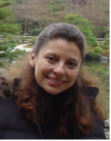Women at NEO
|
|
Chairs:
Nowadays our society relies on drinking water, electricity, horticulture mass production, vaccines, and transportation and even with commodities as air-conditioned or heat systems, which are the result of the scientific research and product development. Despite this, there are only a reduced number of people doing research, accordingly to the 2017 World-Bank report from a population of 7.5 billions, only a 0.093% are working in research, which includes scientific and research assistants (UNESCO report in Science, technology ad innovation, 2017). From this 0.093% only the 28% are women, i.e., 1.96 millions from a total of 7.5 billions or a 0.026% from total world population (UNESCO: Women in Science, 2017). With the data above described is not surprising to encounter women under-representation in the scientific research and development all over the world. Women are known for their capacity as problem solvers, this is an excellent incentive to attract them in areas as engineering, mathematics and physics, which typically have been dominated by men (BBC News: The engineering gap, 2016). A way to increase the number of women in science, in particular in optimization and robotics areas, is to provide gatherings where the presence of female researchers is highlighted. With this idea in mind Women at NEO 2019 presents talks that involve their research field and how they impact. Additionally, this space will be an opportunity to discuss what been a woman and a scientist mean. |
Topics of interested include (but are not limited to):
- optimization
- robotics
- reliability problems
All submissions will be peer reviewed by a panel of international experts.
Contact: Dr. América Morales This email address is being protected from spambots. You need JavaScript enabled to view it. / Dr. Adriana Lara
This email address is being protected from spambots. You need JavaScript enabled to view it.
Short Bios:
América Morales received the B.Sc. degree in chemical-petroleum engineering from Instituto Politécnico Nacional, México in 1994; the M.Sc. degree and the Ph.D. degree, both in chemical engineering from Universidad Autónoma Metropolitana, México, in 1998 and 2001, respectively. From 2001 to 2005 she worked at Instituto Mexicano del Petróleo in the area of applied mathematics research. From 2005 she has been working as a researcher in the Robotics and Advanced Manufacturing program at CINVESTAV, Saltillo, México. She has published 25 papers in journals reported in the JCR and has 265 citations accordingly to the Scopus system and index H of 8. Her interests include nonlinear control systems with applications to industrial process and mobile robots cooperation. She is member of the Automatic Control Mexican Association (http://www.amca.mx/), of the Robotics Mexican Federation (https://femexrobotica.org/) and of the National Research Network (SNI Level I).
Adriana Lara is a Full-Time Professor with the Mathematics Department of the Physics and Mathematics School (ESFM) at the IPN in México City. Her current research interests include Multi-objective Optimization, Hybrid Algorithms, and Data Analysis. She has received the IEEE Transactions on Evolutionary Computation Outstanding Paper Award in 2010 and 2012; also the 2010 Engineering Award granted by the Mexico City's Science and Technology Institute (ICyTDF). She received the B.Sc. degree in Physics and Mathematics from the National Polytechnic Institute (IPN), in Mexico City; the M.Sc. degree in Electrical Engineering and the Ph.D. degree inComputer Sciences from Centro de Investigación y Estudios Avanzados (CINVESTAV-IPN).



